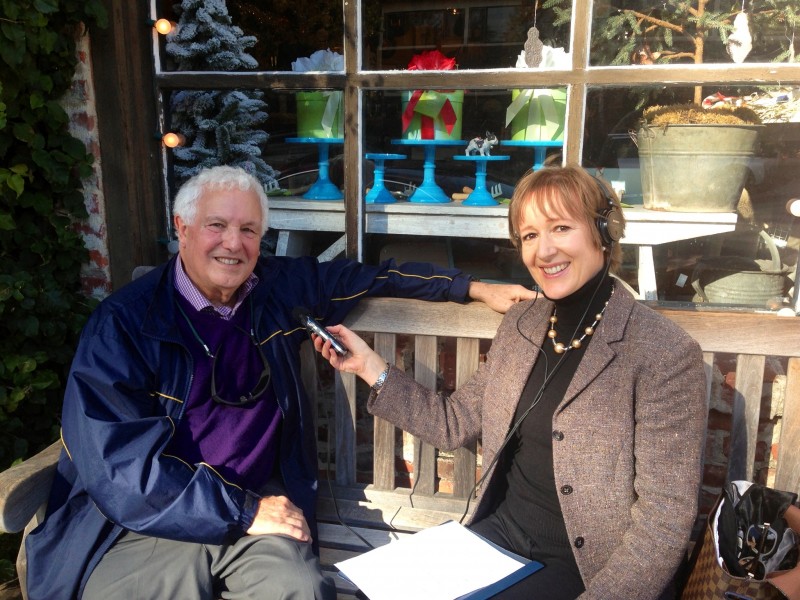
Feb 14, 2014 | Education, KQED
By Alison van Diggelen, host of Fresh Dialogues
PBS NewsHour has recently updated its format with the first all female anchor team, refreshed its website and added a weekend program. How will it change in the next twelve months? Longtime PBS correspondent and San Francisco media personality Spencer Michels shares the long view and asks a key question:
“What can we put on the air that will get people to watch?”
Michels describes how the media landscape has changed dramatically since he became a journalist fifty years ago. As well as anchoring the KQED show “Express” and working on “Evening Edition” with Belva Davis, Michels has been a PBS correspondent and now also contributes to KQED’s latest news show, KQED Newsroom with Thuy Vu and Scott Shafer.
.
Before our video interview, Michels shared a poignant memory from his childhood; an experience that helped plant the seeds for his journey in journalism. He recalls being a child in San Francisco during the Second World War.
“I was without my father for the first three grades in school…it was tough,” says Michels. “I still remember the day that my father returned from the war. It was very dramatic. He drove up in a car. I was at school on the second or third floor and there he was. I was eight years old and hadn’t seen him in three years.”
I asked Michels to describe the scene.
“I did run down and I did embrace him on the street. It was an emotional experience…I’m sure there were tears,” says Michels. “After that, everything changed.”
Those three years were formative for Michels, who went on to explore the world during a remarkable career in journalism. After working for PBS NewsHour as a national correspondent for 30 years, he was laid off last year during a major cost cutting exercise. As weekend anchor, Hari Sreenivasan recently explained to Jon Stewart on the Daily Show, “facts are expensive.” That is, doing intelligent, original journalism doesn’t come cheap, especially in the Bay Area.
PBS NewsHour may have found one answer to the plunge in television viewers and that’s PBS Digital Studio’s new show “Everything but the News” the brainchild of Steve Goldbloom and Noah Pink.
It’s a tongue in cheek, behind the scenes look at the work of a PBS NewsHour correspondent. The low budget, goofy juxtaposition between Goldbloom and his demanding PBS NewsHour producer, Jordan Smith, is downright hilarious at times. On air Introductions by news heavyweights like Judy Woodruff, Gwen Ifill and Hari Sreenivasan lend gravitas to the whole endeavor. PBS NewsHour hopes it will help to capture the exodus of its audience from television to online streaming and grab more younger viewers in the process. It looks like a winning formula.
At Fresh Dialogues, I’m used to getting Fresh Answers, but as you’ll see in this interview, I also got some unsolicited media tips from a pro. 
Michels was too kind to comment on my excessive head nodding, but I will definitely be working on that.
Check out other Fresh Dialogues interviews with Elon Musk, Meryl Streep and Jeffrey Toobin at the Fresh Dialogues YouTube Channel.
Join the conversation at Facebook and share your stories.
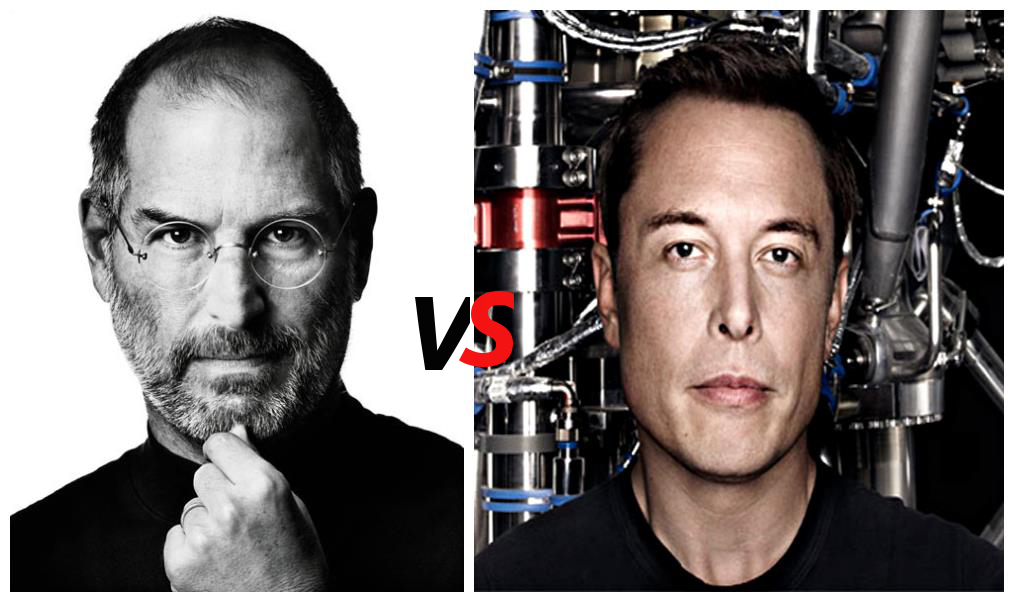
Feb 5, 2014 | Electric Vehicles, Entrepreneurship & Innovation
By Alison van Diggelen, host of Fresh Dialogues
Elon Musk has been hailed as the next Steve Jobs, a serial disruptor and a genius. Others call him just crazy. Yet Musk has defied the naysayers and made remarkable innovations in both electric cars and spaceflight over the last ten years. But just how accurate is the Steve Jobs comparison?
“Most innovation is like a new melody,” writes Ted curator Chris Anderson. “For Jobs and Musk, it’s the whole symphony.”
Anderson’s analogy is right. Neither men do things in small measures. They seek to change the world.
I interviewed Elon Musk last year in one of his most revealing public appearances, and he exposed a complex character that is both deadly serious yet comedic at times; driven yet sensitive; single minded, and yet eclectic in his desire to change the world in multiple ways.
.
That sensitivity was apparent several times during our dialogue when his eyes welled up in response to my questions about the future of NASA, Neil Armstrong, and candlelight vigils for the EV1 (@28:35, 1:04:00 & 39:50 in the video). Steve Jobs was also known to weep.
Musk has many traits in common with Jobs and yet in subtle ways their characters are distinct. Elon Musk vs Steve Jobs. The two did meet, but it didn’t go well.
Here are five revealing moments from our conversation that emphasize the common threads between the two businessmen.
1. Ability to Sell Great Ideas
Jobs used his infamous “reality distortion field” to push his teams hard to achieve much more that they thought was possible. His oft-quoted phrase was “insanely great” and his product launches were passionate and brash.
Musk is more pragmatic in his approach, he rarely uses buzzwords*, and although his product launches are often equally dazzling, his delivery is less assured, more halting.
*Granted, he does talk about getting a “money shot” of his greenhouse on Mars idea (@30:00 in the video).
“In the beginning there will be few people who believe in you or in what you’re doing but then over time… the evidence will build and more and more people will believe in what you’re doing. So, I think it’s a good idea when creating a company to … have a demonstration or to be able to sketch something so people can really envision what it’s about. Try to get to that point as soon as possible.” Elon Musk
This Word Art of our 90-minute conversation reveals no catchy buzzwords, though the word THINK stands out prominently.
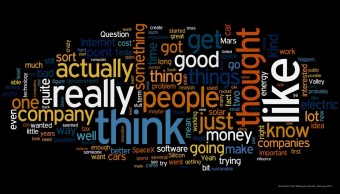
Source: Tyra Robertson
2. Obsessive Attention to Detail:
Stories abound of Steve Jobs’ intense attention to detail. He notoriously spent months agonizing over the internal layout of the Mac computer’s circuit board.
“I want it to be as beautiful as possible, even if it’s inside the box. A great carpenter isn’t going to use lousy wood for the back of a cabinet, even though nobody’s going to see it.” Steve Jobs
When his team failed to deliver on his vision, Jobs often flew into terrible rages. Case in point: the first fanless computer.
By contrast, Musk is known for his attention to detail and being a demanding boss, but he focuses his Vulcan rage at the media over issues like damning test drives, and Tesla car fires; and at foes such as auto dealerships.
His rage also turns inward. For example, when he discovered the wrong type of screw used in the Model S sun visors. He reportedly said, “they felt like daggers in my eyes.”
While doing pre-interviews with Musk’s colleagues, I heard a revealing story about his obsession with the Tesla Model S key fob. A colleague described how he agonized for weeks over the shape, the girth, the weight of the fob till it was just right. Take a peek at the end result and see if you think it was all worth it.
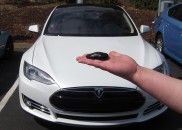
When I visited the Tesla factory (on assignment for KQED), I heard a similar story from the mechanics working on the iconic Model S door handles. Responsive door handles that sit flush with car doors looked like mission impossible, yet Musk and his team eventually prevailed. The result is so highly prized that my tour guide, Gilbert Passin (VP for manufacturing at Tesla) forbade me to take close-up photos of the components, for fear of copycats.
3. Ability to Think Differently Stems from Splendid Isolation
When I asked Musk if he was a lonely kid, he replied:
“I wasn’t all that much of a loner…at least not willingly. I was very very bookish.” Elon Musk
As a kid he was consumed by his own world, reading books like “The Hitchhiker’s Guide to the Galaxy,” and playing Dungeons and Dragons for hours. Musk found coding a piece of cake and created his own software at the tender age of 12. Thanks to his bookish childhood, his innovative ideas could flourish without being squashed by friends or family.
Similarly, Jobs had an isolated childhood, and was bullied at school. He did no competitive school sports and was obsessed by electronics and gadgets.
4. Deep Thinking
Although Jobs was less techie, more visionary; and Musk is a geeky engineer who prides himself on innovation using scientific first principles, both are deep thinkers.
Elon Musk explained how Hitchhiker’s Guide to the Galaxy inspired him while he was looking for the meaning of life as a teenager.
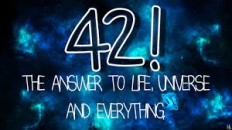 “It highlighted an important point, which is that a lot of times the question is harder than the answer. And if you can properly phrase the question, then the answer is the easy part. To the degree that we can better understand the universe, then we can better know what questions to ask. Then whatever the question is that most approximates: what’s the meaning of life? That’s the question we can ultimately get closer to understanding. And so I thought to the degree that we can expand the scope and scale of consciousness and knowledge, then that would be a good thing.” Elon Musk
“It highlighted an important point, which is that a lot of times the question is harder than the answer. And if you can properly phrase the question, then the answer is the easy part. To the degree that we can better understand the universe, then we can better know what questions to ask. Then whatever the question is that most approximates: what’s the meaning of life? That’s the question we can ultimately get closer to understanding. And so I thought to the degree that we can expand the scope and scale of consciousness and knowledge, then that would be a good thing.” Elon Musk
Walter Isaacson, the author of Jobs’ biography wrote that Jobs felt throughout his life that he was on a journey — and he often said, ‘The journey was the reward.’ But that journey involved resolving conflicts about his role in this world: why he was here and what it was all about. He had a lifelong interest in Zen Buddhism and they discussed whether or not he believed in an afterlife.
“Sometimes I’m 50-50 on whether there’s a God. It’s the great mystery we never quite know. But I like to believe there’s an afterlife. I like to believe the accumulated wisdom doesn’t just disappear when you die, but somehow it endures.” Steve Jobs
5. Impact
Although Musk isn’t yet the household name that Jobs has become, those who’re familiar with Musk’s work and genius compare him to Leonardo da Vinci and The Atlantic recently described him as one of the most ambitious innovators of this era. And what about Steve Jobs? He was described in the study as “a star of popular culture.”
Ouch!
During our interview, Musk shared the story of his brief encounter with the great Steve Jobs. The two were introduced by Google’s Larry Page at a party and Musk describes Jobs as being “super rude” to him. Nevertheless, this didn’t dent his admiration for the Apple guru. Here’s our dialogue:
Elon Musk: “The guy had a certain magic about him that was really inspiring. I think that’s really great.”
Alison van Diggelen: “Is it that magic that you try to emulate?”
Elon Musk: “No, I think Steve Jobs was way cooler than I am.”
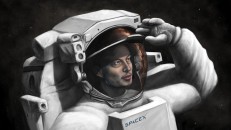 Although Apple fans will agree strongly with that assessment, feedback at YouTube loudly contradicts Musk. Here’s one of the more polite reactions:
Although Apple fans will agree strongly with that assessment, feedback at YouTube loudly contradicts Musk. Here’s one of the more polite reactions:
“Sounds just like Thomas Edison and Nikola Tesla. Except Elon Musk will probably end up being much more memorable than Steve Jobs :P”
As 2014 begins, Musk is still right, Steve Jobs is generally perceived as being “way cooler” than him. But that could change.
What will the history books conclude, in ten or twenty years from now? Steve Jobs certainly has big shoes to fill, but Elon Musk is already beginning to fill them. A lot will depend on Musk’s ability to see his grand visions come to fruition. First, he must complete his “Secret Master Plan for Tesla,” which includes the creation of a popular mass market electric car; and second, his vision of making space rockets reusable just like modern day jets.
One day, he may even achieve his life’s mission of dying on Mars, but as he describes it, “Just not on impact.”
Now that would be cool.










